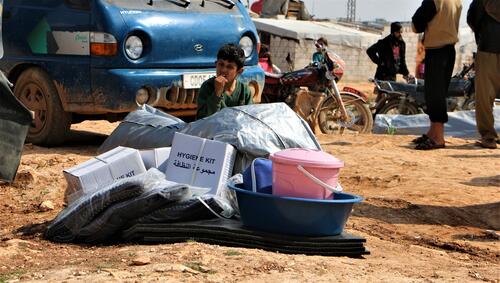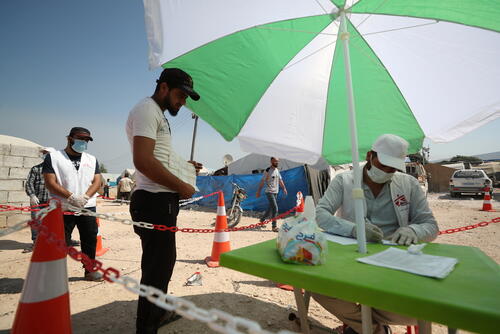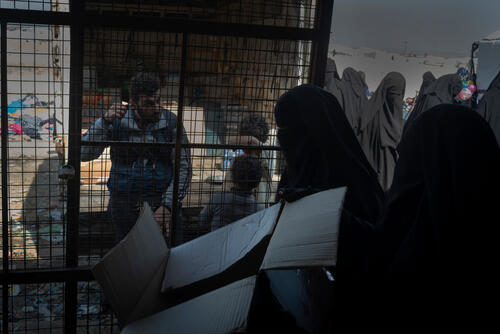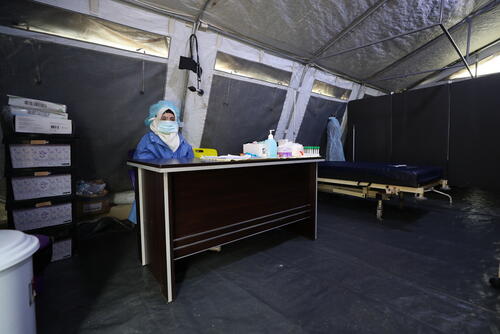Deir Hassan camp in Idlib province, northwestern Syria, is one of the many camps to which hundreds of thousands of displaced families fled, to escape the military offensive by Syrian government forces with their Russian allies between December 2019 and early March 2020. Deir Hassan camp hosts more than 164,000 people in settlements scattered over the hills and, as is the case across northwest Syria, it lacks basic services. It is now also threatened by the potential spread of COVID-19.
On 16 March, after assessing the needs in Deir Hassan camp, Médecins Sans Frontières (MSF) distributed essential items to 180 families in the Latamneh and Al-Habeet settlements, including family tents, mats, plastic sheeting, blankets, cooking sets and hygiene kits.
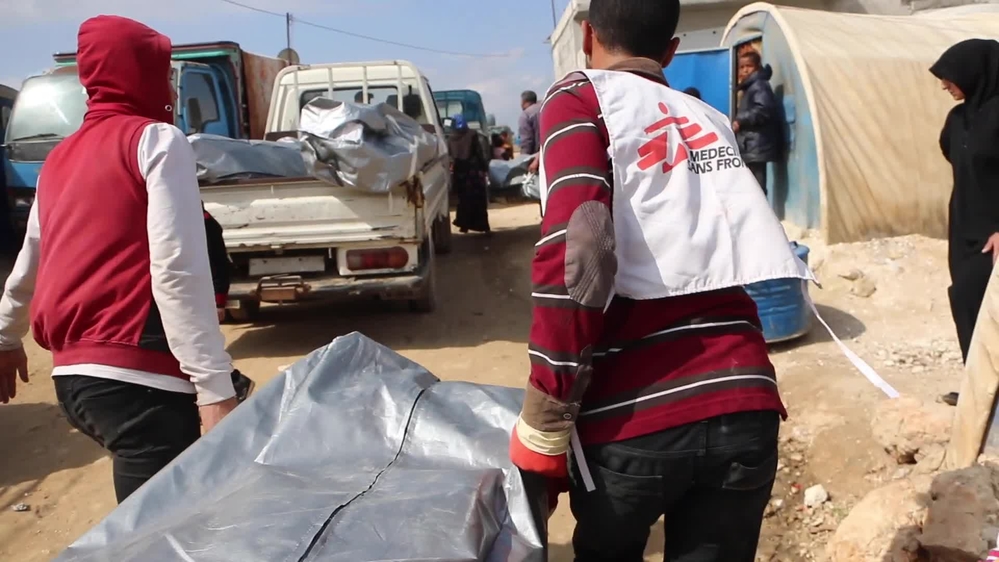
Distribution of shelter and items in Deir Hassan
“We witnessed people living in the open; we also saw two or three families sharing a tent which did not protect them from the cold or the rain,” says Ahmed, MSF project team leader. “There were too few tents to accommodate the new arrivals.”
The next day, the MSF team distributed the same relief items to 115 families in Abo Obeidah, another settlement in Deir Hassan.
“Thanks to MSF, we got tents,” says Manaf Shamma, a displaced mother living in Latamneh. “This camp was set up eight months ago, but it needs latrines, sewage, proper roads.”
COVID-19 pandemic adds to health risks
In Deir Hassan camp, the water and sanitation facilities are inadequate for such large numbers of people, raising the risk of water-borne diseases. So far, upper respiratory infections have been the main condition seen by the MSF mobile clinics. But now the coronavirus COVID-19 pandemic has become a huge challenge worldwide and in Syria.
The Syrian government reported the first case of COVID-19 in Syria on 23 March. While no cases have been declared in Idlib province, the last rebel stronghold, the disease may spread very quickly through the region, especially in camps, where people live in large settlements, in overcrowded conditions with little sanitation.
MSF has suspended our mobile clinics in Deir Hassan camp to allow our staff to attend training on infection prevention and control (IPC), and to make sure they won’t spread the virus. In the coming days, MSF community health workers will hold health education sessions on COVID-19 with displaced families in 10 settlements in Deir Hassan camp, and will distribute leaflets and specific hygiene kits.
As our teams are now focusing their work on infection prevention and control measures, they are providing assistance for the triage and screening of patients in the two MSF-supported health centres, in Deir Hassan and Tal Karama.
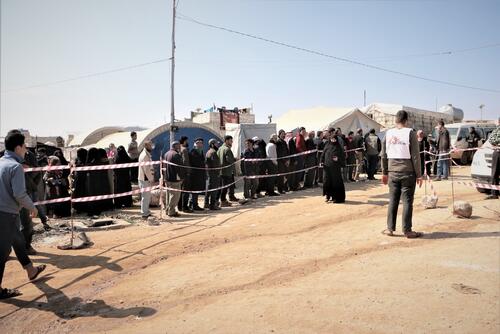
Providing shelter and essential items to families further north in Afrin
Alongside this, MSF is organising the distribution of much needed relief items in the Afrin area, further north. Many displaced families sought refuge in this area, as it is controlled by Turkish forces and has not seen any violence.
Some couldn’t find proper shelter and settled in unoccupied houses, factories or public buildings. In response, an internally displaced people’s (IDP) camp in the Bul Bul area is being set up on a dedicated site for 400 displaced families. We will supply tents, blankets, plastic sheeting, cooking sets and hygiene kits for them. The tents will be put up in partnership with Al-Ameen, a local NGO. And once the tents are ready, the displaced families will move into the camp and receive the relief items.
MSF and Al-Ameen also began running mobile clinics last week in the Bul Bul area and in the western Afrin countryside. But these were suspended to allow staff to attend IPC training.
Considering the huge needs of IDPs in Idlib province, our response remains limited. But it must continue to increase. Our ability to scale-up our assistance will depend on a steady flow of essential relief items, medical supplies and personal protective equipment reaching northwest Syria and also on the ability to send in MSF international staff to support their Syrian colleagues.
MSF has no presence in Turkey. To be able to scale-up the response, we ask all relevant Turkish authorities to facilitate the transit of essential supplies and international staff into northwest Syria.
Across northwest Syria, MSF teams provide maternal healthcare, general healthcare and treatment for non-communicable diseases through mobile clinics. They distribute relief items, including heating material and improve water and sanitation systems. They also support regular vaccination activities.
In northwest Syria, MSF runs a specialised burns unit that provides surgery, skin grafts, dressings, physiotherapy and psychological support. MSF provides support to primary and secondary healthcare in several hospitals and clinics throughout Idlib and Aleppo governorates and has co-management partnerships with three hospitals. In response to COVID-19, MSF is now implementing IPC measures in medical facilities it runs or supports, and also organising the triage and screening of patients and training on IPC. In camps, protective measures are put in place for the medical staff and the patients.
MSF’s medical programmes across Raqqa, Hasakeh and Aleppo governorates in northeast Syria continue. MSF runs activities in Al-Raqqa, Kobane/Ain Al-Arab, Al-Hol camp, Washokani camp, and Tal Kochar/Yaroubiyah, and is supporting the local health authorities with COVID-19 outbreak preparedness.
To ensure its independence, MSF receives no government funding for its operations in Syria.



